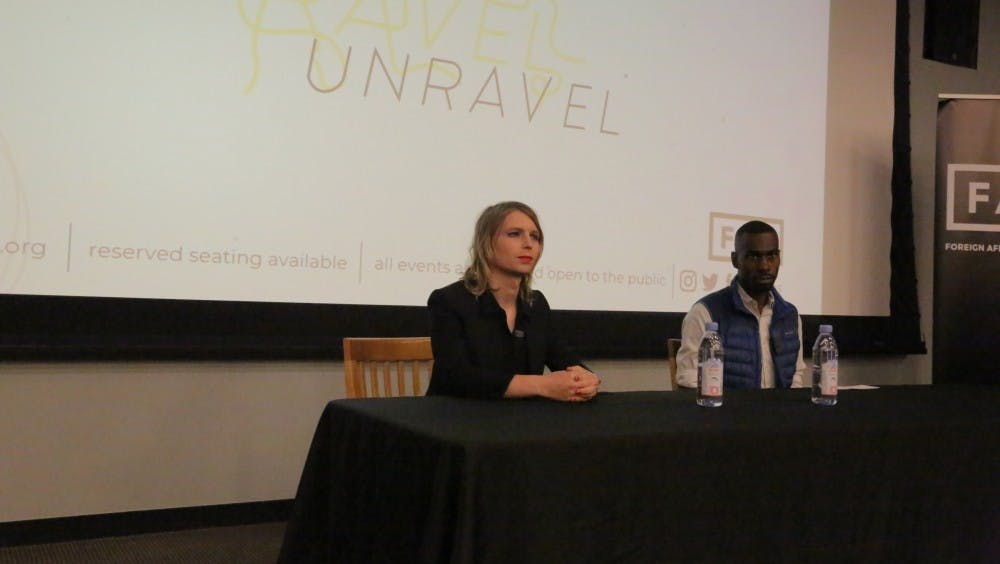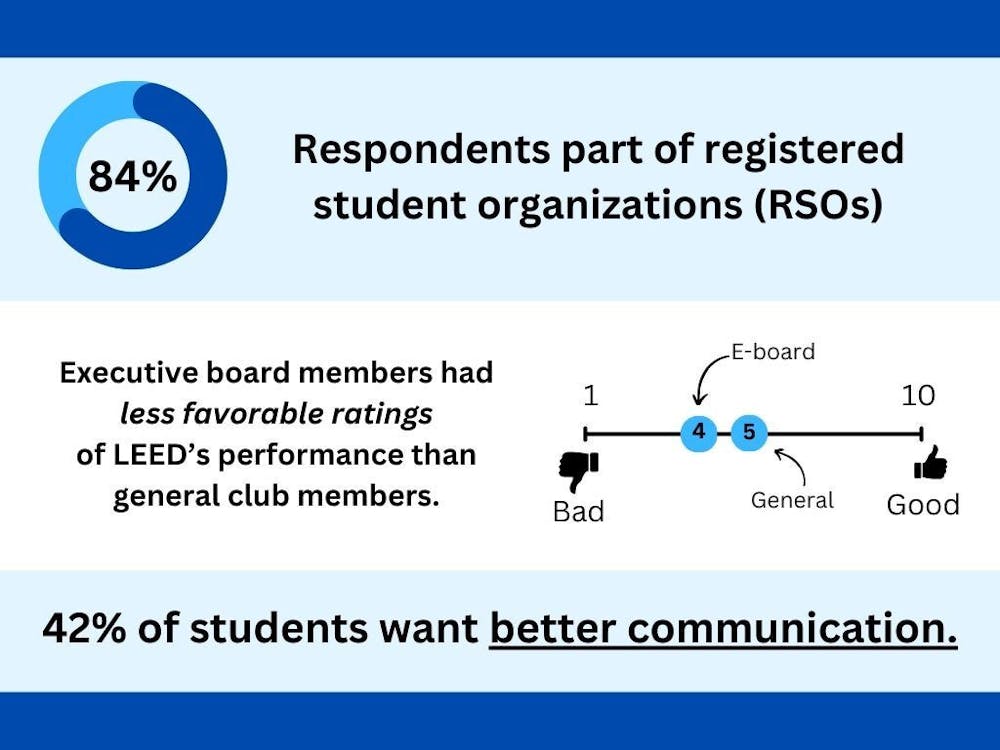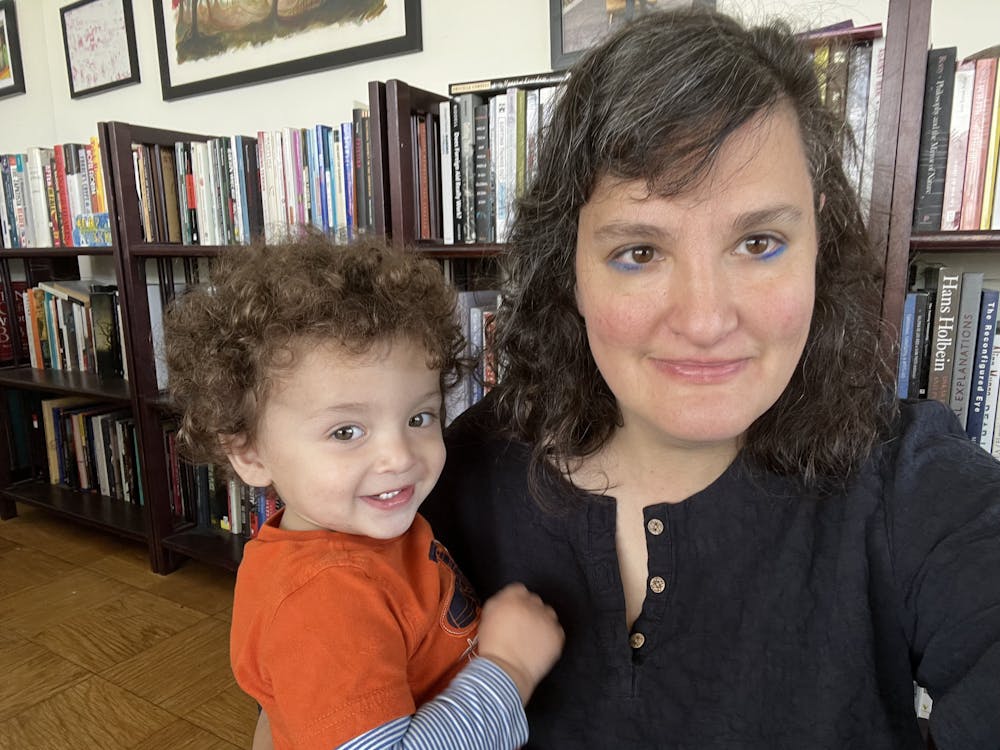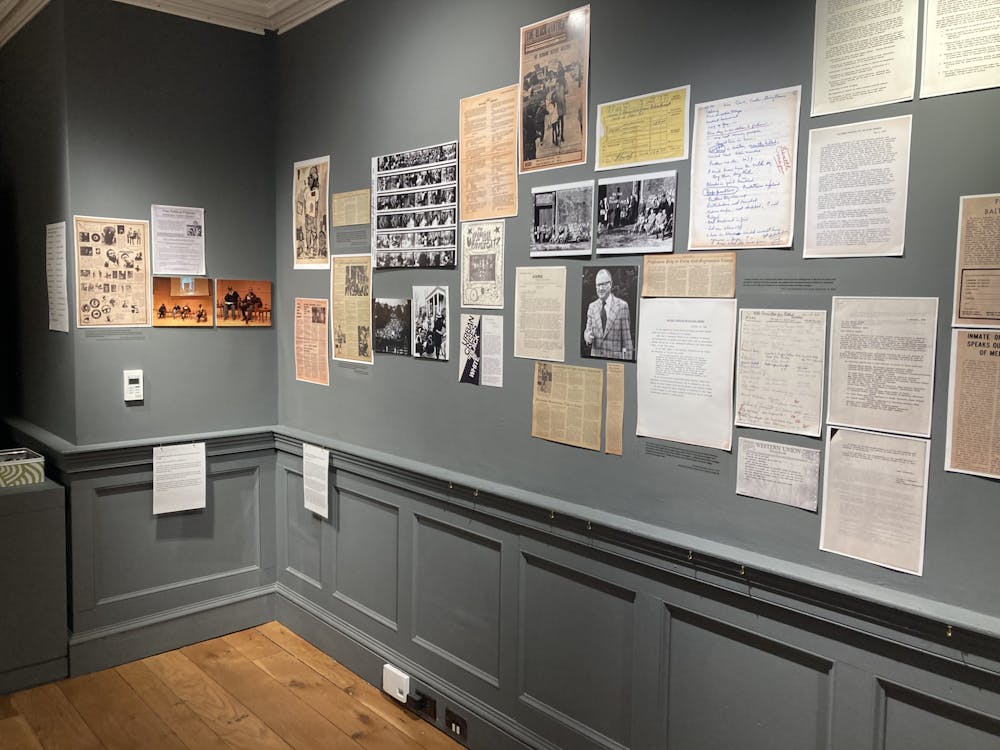Government whistleblower and Maryland senatorial candidate Chelsea Manning spoke at the Foreign Affairs Symposium (FAS) on Monday. DeRay Mckesson, a local civil rights activist, moderated the discussion.
In 2013, Manning was sentenced to 35 years in prison after leaking more than 750,000 military documents while she worked as an intelligence analyst for the Department of Defense. Former U.S. President Barack Obama ordered her release in January 2017.
On the day after her conviction in 2013, Manning publicly came out as a transgender woman, prompting controversy in the LGBTQ community. Since her release, Manning has become an activist for prison reform and an advocate for LGBTQ rights.
Manning announced this January that she will challenge incumbent Ben Cardin (D-MD) for his U.S. Senate seat this November.
In addition to leaking documents, Manning came into more criticism after she was photographed with white supremacists after her campaign announcement.
Manning said that while she is a controversial figure, people should view her as a regular person.
“I have to figure out how I’m going to pay rent, I have to figure out what I’m going to have for breakfast,” she said. “Words like hero or traitor or criminal or whatever, they just feel like words and nothing else.”
According to Manning, it was difficult to get used to life outside of prison. She called for prisons to be abolished, seeing them as a means of political suppression.
“You could try and say that it’s about rehabilitation, but it’s purely about power, and it’s purely about keeping a class of individuals from society,” she said.
Freshman Hesu Song agreed that many are incarcerated for minor offences but questioned whether Manning’s idea of abolishing prisons was reasonable.
“There are actual people out there who are probably not good for society,” Song said.
Her stance on prison reform is not the only thing that has caused controversy for Manning.
In January, photos emerged online of Manning posing with members of the far right at a pro-Trump party thrown by conspiracist Mike Cernovich. The photos included her laughing next to controversial figures such as Gavin McInnes who has said defamatory things about the LGBTQ community in the past.
At her talk, she said that she attended the event as a spy rather than an informant or supporter of alt-right groups.
She said that in retrospect, attending the event was “stupid.”
“I really hurt a lot of people,” she said. “I thought I was doing something helpful, and I thought I was doing something productive.”
Jilliann Pak, co-executive director of FAS, was pleased by the way Manning addressed her involvement in the alt-right event.
“I really appreciated her honesty and her candor,” Pak said. “To backtrack and say that what she did was wrong and that her position of privilege actually hurt people was incredibly honest and important.”
In addition to her controversies, Manning discussed U.S. foreign policy, particularly in countries such as Iraq and Afghanistan.
“We just keep expanding, expanding, expanding. We have the largest military in the world, the largest intelligence apparatus in the world and — as a reminder — the largest prison system in the world,” she said.
Manning believes that U.S. military and law enforcement do more harm than good in the long run, both at home and overseas.
“These [institutions]don’t keep anyone safe,” she said. “It’s a domestic military occupation that police forces are engaged in in the most vulnerable communities.”
She believes people need to move beyond conventional forms of participation in order to promote change.
“Direct action gets the goods,” she said, “You have to start doing things outside of the norm, outside of the process.”
Manning said that voting is not enough to initiate change.
“If you go to the ballot box expecting change in 2018, I don’t know what to tell you,” she said. “We really need to start thinking further and thinking outside the box because we can’t wait anymore.”
Alina Spiegel, a first-year student at the School of Medicine, agreed that direct action is important to promote change.
“One issue with our current political system is that it’s really skewed towards the influences of people that have money and corporations that have money,” she said. “The best way to kind of steer us away from that, besides advocating for campaign finance reform, is to make sure that voices are heard, and the only way to do that is to pick up your phone and call your senator, to go to Annapolis.”
Spiegel praised Manning for having a lot of positions that other politicians are unwilling to take.
“I hope that at the very least she’s able to gain a lot of publicity and get a lot of support, particularly from people from our generation,” she said.
Freshman Cindy Cho said that she did not think Manning’s campaign would be successful in getting her elected.
First-year student at the School of Medicine Dylan Hardenbergh agreed.
“I personally don’t know that much about her chances of being elected, but I definitely think it’s awesome that she’s putting herself out there and spreading awareness and knowledge about these issues,” he said.
Freshman Sally Lu also questioned whether Manning’s controversy would affect her chances of winning.
“Manning can be considered a little radical in her views,” Lu wrote in an email to The News-Letter. “Her notoriety sits differently with many people. I’m confident she can stir change but I don’t know if it’s the type of change Maryland constituents want.”
She added that Manning may be able to use her controversy to her advantage.
“We’ve seen a trend of ‘outsiders’ and anti-establishment candidates running for office and so far, they’ve had unprecedented success. She has a fresh perspective and, as a trans woman, her decision to run is also a symbol of progress,” she wrote.
Manning said that being vocal as a public figure is particularly important to her because of her political beliefs and gender identity.
“I don’t know how safe it’s going to be to be the kind of person that I am five years from now — an outspoken, politically controversial trans woman,” she said.
Manning discussed the difference between visibility and equality. She explained that she was homeless in 2006 and noted that while movements such as the marriage equality are a step in the right direction, the LGBTQ community still struggles with high rates of homelessness.
Senior Alyssa Mefford said that Manning’s open expression of her identity resonated with her.
“She really opened my eyes to the fact that visibility is a step, but it’s not equality,” she said. “You can still be visible and be denied services or the same rights as someone who is perhaps living as a cis heterosexual person.”
Freshman Nina TuCai appreciated that Manning represented herself as an ordinary person.
“It doesn’t take a hero or a traitor to do something big. I just thought that was a really really nice point she made,” TuCai said. “It was very eye opening and I feel lucky to have sat in on that.”
















Please note All comments are eligible for publication in The News-Letter.